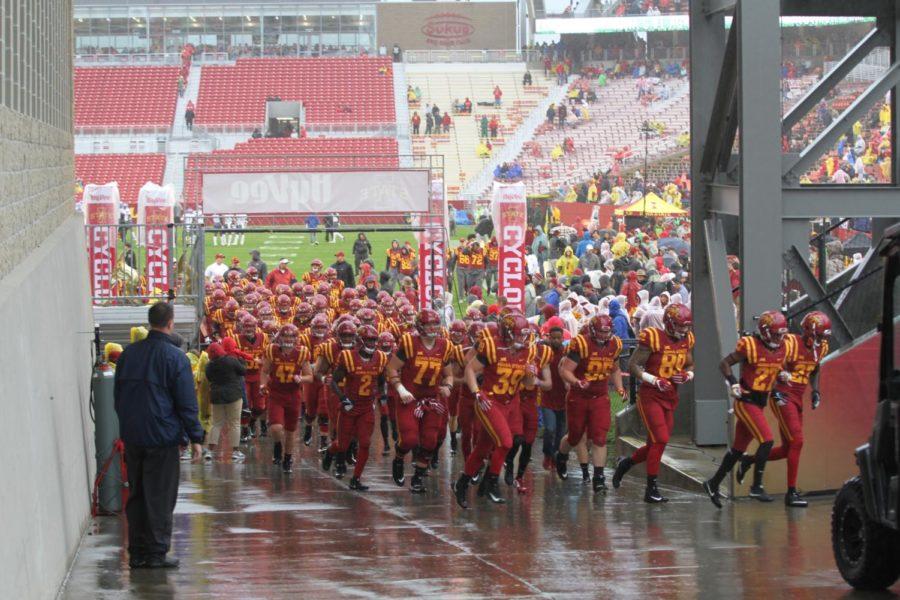Holst: The NCAA needs to compensate its athletes more fairly
Members of the Iowa State football team leave the field after warmups. The game against Kansas was delayed due to weather conditions.
October 13, 2017
Recently, “shocking” news broke in the world of college basketball. The FBI is investigating numerous NCAA basketball programs and shoe companies (primarily Adidas) for corruption, wire fraud and bribery.
One specific accusation is that Louisville allegedly funnelled $100,000 from Adidas to a recruit in order to “persuade” players to play basketball for the Louisville program.
This scandal shook the world of college sports, and will likely lead to the firing of dozens of coaches across the country. However, this wasn’t surprising to those who follow college sports closely.
The real shame here is that the students will be suspended from participating in NCAA basketball activities, all because he made the no-brainer decision of accepting more money than he’d ever made in his life. There is a way to make sure that millionaire coaches and athletic directors don’t take advantage of these 18 year old kids: start paying college athletes, at least in major sports.
This is not a column meant to explain how the NCAA could start paying student athletes. I have not come up with a comprehensive plan for the NCAA to start doing so.
However, it is quite obvious to many that it is immoral for an organization like the NCAA to make billions of dollars off of athletes who cannot make any kind of profit off their own names. Yes, they’re getting an education. But that education is often subpar.
Athletes are often shunted into a select few majors, advised to take easy classes that don’t benefit them and as a result receive a degree without really getting prepared to do a job after they graduate. Furthermore, they have little time for internships or other activities that could also help prepare them for jobs outside of sports.
So while they are receiving a degree at a greatly decreased cost, one could easily question the value of the education that they get.
Many will also argue that many programs, specifically football programs, don’t turn a profit, so they can’t afford to pay the players. This is, quite frankly, ridiculous.
First of all, if programs like Iowa or Alabama or Stanford or Minnesota can afford to give their coaches multi-million dollar contracts, they can afford to share some money with the players.
Also, another reason that many programs don’t turn a profit is because they blow money on things that are not strictly sport related. For example, the University of Georgia has a DJ booth in its football locker room. Again, if a program can get a DJ booth in its locker room, it can afford a small amount of compensation for its athletes.
If none of this moves you, there are still other things the NCAA could do for its athletes besides paying them that would make the system more fair.
For example, allowing athletes to unionize and represent themselves as employees would give student-athletes the ability to get more fair treatment. They could negotiate for higher scholarship amounts because, contrary to popular belief, many schools can’t actually give scholarships that cover the full cost of college.
They could also negotiate for medical costs to be covered by the NCAA, prevent colleges from revoking scholarships due to serious injury and the ability to benefit commercially from their abilities.
To be clear, this falls short of paying the athletes outright, but at least it would allow the players to be treated more fairly by the NCAA and their universities.
These athletes are incredibly gifted, and they work hard for the opportunities they get. They deserve to be treated as employees by the people that are making billions off their backs. Otherwise, the NCAA’s corruption and malpractice will continue to take advantage of kids who are simply trying to live out their dreams.







